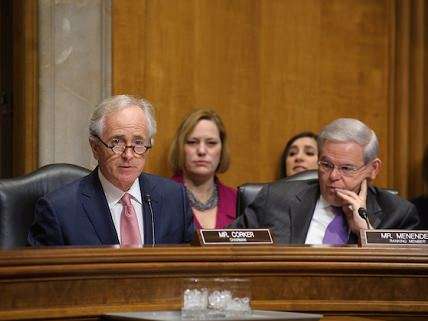White House Escalates Campaign for Support for Possible Iran Deal; Worry Bipartisan Legislation Could Torpedo It
Congress rejecting a deal could have the benefit of extricating the U.S. from a role as world policeman it shouldn't be in anyway.


There are still two and a half months left before U.S., Iranian, and other negotiators hit their deadline for arriving at an agreement on Iran's nuclear program along the outline agreed upon earlier this month. While the preliminary "understanding" negotiators arrived at laid out the contours of a potential deal about Iran's nuclear program, there are a lot of details remaining to hash out, and there's no guarantee the seven countries involved will come to a final agreement just because they came to an initial agreement about the agreement.
Now the White House worries bipartisan legislation in the Senate that could be voted on in committee as early as today could scuttle the deal before one even materializes. Legislation from Sen. Bob Corker (R-Tenn.), the chair of the Senate Foreign Relations Committee, would give Congress one month to endorse or torpedo the deal—the legislation says Congress not acting one way or the other on it would be interpreted as support. The White House argues such a move at this stage would hurt negotiations. National Journal reports:
Top Obama administration officials are scrambling to prevent a veto-proof majority for bipartisan legislation that would give Congress power to scuttle the brewing U.S.-Iran nuclear agreement.
The White House is waging a stepped-up campaign to maintain its leeway and promote the preliminary agreement reached early this month, even as lawmakers weigh changes that could increase political support for the bill in Congress.
The administration's effort, which includes briefings for lawmakers by a trio of Cabinet officials and more than 100 lobbying phone calls, arrives as top Senate Republicans are signaling plans to advance the bill quickly.
In fact Corker says he's reached bipartisan agreement on his legislation by making a number of changes not yet shared with the public. Specifically, the bill cuts down to 30 days from 60 days the amount of time Congress has to act on a deal if one is finally reached. There's also been a debate among putative supporters of the bill over whether Iran's terrorist activity should be linked to the deal—it's generally not at the moment—and whether Iran's refusal to recognize Israel ought to factor into the deal.
Importantly, it doesn't appear as if Corker's bill rests on the claim that the Senate has the Constitutional authority to provide or withhold advise and consent to international treaties, but creates its own legal mechanisms to allow Congress to approve or reject the deal. That's not completely surprising. Over the course of the last several decades, Congress has steadily ceded its authority on various foreign policy matters to the White House. President Obama has ordered a number of military operations without any pretense even of an attempt to get Congressional authorization. And not once has Congress asserted its role in the process of warmaking.
And in the case of a potential Iran deal, Congress is also far off from public opinion on the matter. While Corker's effort appears to be gaining support from new Democrats every day (and is already supported by pretty much every Senate Republican, even Sen. Rand Paul (R-Ky.), who once advised patience and giving negotiators more time to do their work), polling shows about 60 percent of Americans in favor of a potential deal with Iran and even more, 65 percent, in favor of Congress giving negotiations the space to succeed. The White House argues Congressional action could hurt negotiations, but even though the legislation comes from a position of skepticism about any deal and complicates the idea that as long as negotiators can agree on something there will be a deal, it may not matter all that much more than the "open letter" Republican senators sent Iran last month.
Paul, who had been among the few Republican supporters of negotiations with Iran, argued he signed the letter to strengthen President Obama's hand in negotiations by demonstrating how much opposition there is at home to a deal. In a similar way, it's possible the Corker legislation could motivate negotiators to come up with a better deal to avoid action by Congress that could squash it. And if negotiators walk away from the table over the mere threat of Congressional action—which is what passing the legislation essentially is—then the foundation for negotiations was much flimsier than advertised.
Negotiators from all countries involved should remain motivated about coming to an agreement that benefits everyone. Even if the Corker legislation passes, there's no guarantee Congress would reject a deal if one was agreed to. And even if Congress did reject such a deal, it could only prevent those portions of the deal relying on the U.S. changing its Iran-related laws. There are five other countries—the U.K., Germany, China, Russia, and France—involved in talking to Iran and none is obligated to walk away from a deal because the Congress voted in a joint resolution that they didn't like it. Insofar as Congress rejecting a deal that could go through with broad international support anyway extricates the U.S. from the role of world policeman when it comes to "rogue" nations accused of misconduct, it could even be a blessing in disguise.


Show Comments (12)